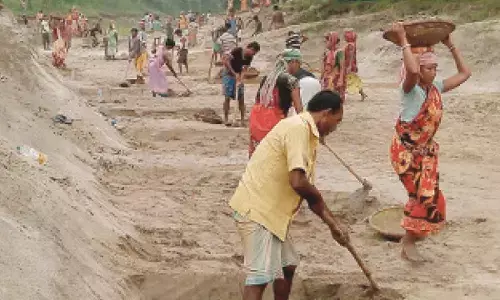Assam tea garden workers battle Malaria, vector-borne diseases

Assam Tea Garden Workers Battle Malaria, Vector-Borne Diseases. It\'s an annual affair in Assam\'s lush tea gardens. As sporadic showers from March build up to a full-blown monsoon a few months later, what looms is the threat of malaria and other vector-borne diseases that often cause death, with children the most vulnerable.
 Jorhat (Assam): It's an annual affair in Assam's lush tea gardens. As sporadic showers from March build up to a full-blown monsoon a few months later, what looms is the threat of malaria and other vector-borne diseases that often cause death, with children the most vulnerable.
Jorhat (Assam): It's an annual affair in Assam's lush tea gardens. As sporadic showers from March build up to a full-blown monsoon a few months later, what looms is the threat of malaria and other vector-borne diseases that often cause death, with children the most vulnerable.
As WHO focusses on vector-borne diseases this World Health Day April 7, experts say that serious steps must be taken to stop the cyclic prevalence of these diseases among the tea tribe every year.
"Malaria is a major health problem among the tea garden workers. Although there has been a gradual fall in morbidity due to the disease, the numbers are still alarming," N.K. Phukan, former chairman of the medical advisory sub-committee of the Assam Branch of the India Tea Association (ABITA), told IANS. He is also a doctor in a tea garden.
For instance, there were 4,849 slide positive cases of malaria in the tea gardens (under ABITA) in 2008. The number fell marginally to 4,307 in 2009, but was still high. Globally, one billion people are infected and more than one million people die every year due to vector-borne diseases, says WHO.
The most significant reason for the high prevalence of malaria and other vector-borne diseases in India's northeast is its topography and climate - hot and humid for most part of the year - making it the ideal breeding ground for mosquitoes. Add to this, the poor socio-economic condition of the tea tribe, lack of awareness and poor hygiene - and they become even more vulnerable.
Assam accounts for more than five percent of the country's malaria cases and, according to a study in seven tea gardens by molecular entomologist Bipul Rabha and doctors of those gardens, the tea tribe community is the major contributor to such cases every year.
"The tea tribe constitutes a community with poor socio-economic condition and continues to have high malaria infection with considerable anaemia. This study strongly finds evidence that despite a comprehensive malaria control programme, there are regions in India where the control programmes are inadequate," the study said, adding: "These are hyper-endemic for malaria and transmission rates are comparable to those found in many regions of Africa."
The part about anaemia is especially significant because the tea tribe women are nearly universally anaemic. A Unicef sample study found 95 percent women in the gardens to be anaemic. A reduced haemoglobin level among the tea tribe, the malaria study said, was not just indicative of poor nutrition but also of repeated attacks of the vector-borne disease. Either way, anaemia leads to a host of other health complications, especially for women during pregnancy, putting their and their baby's life at risk.
"Children, especially those below the age of two, are at a high risk of malaria infection because they have under-development immunity. Studies have found that the risk of infection caused by P. falciparum parasite (transmitted by Anopheles mosquito) is high between the age of five and 15," said T. Talukdar, a tea garden doctor in Jorhat district.
Steps have been taken by tea garden managements to curtail the annual incidence of vector-borne diseases. "Water stagnation is an open invitation to trouble, and we get insecticide sprayed in the garden and labour lines regularly once the rains hit (the dense and well-demarcated tea tribe colonies within the garden)," Talukdar said.
The state government also distributes a 'Mamata' kit to new mothers after institutional delivery which contains a baby mosquito net apart from other things.
Phukan however feels more measures need to be taken. "Good laboratory facilities in the garden hospitals is necessary for blood slide examination, early case detection and prompt treatment. Use of mosquito nets impregnated with synthetic pyrethroids is important (the Assam government distributed such nets to new mothers under a pilot project a few years back), periodic anti-larval measures and health education in the community are crucial," he said.
"It is unacceptable that malaria continues to be a major health problem year after year," Talukdar opined. "An ailing workforce ultimately affects productivity and that should be a concern to the tea industry as well as the government because tea is a major economic source for the state of Assam and is an important industry for India," he added.
IANS

















